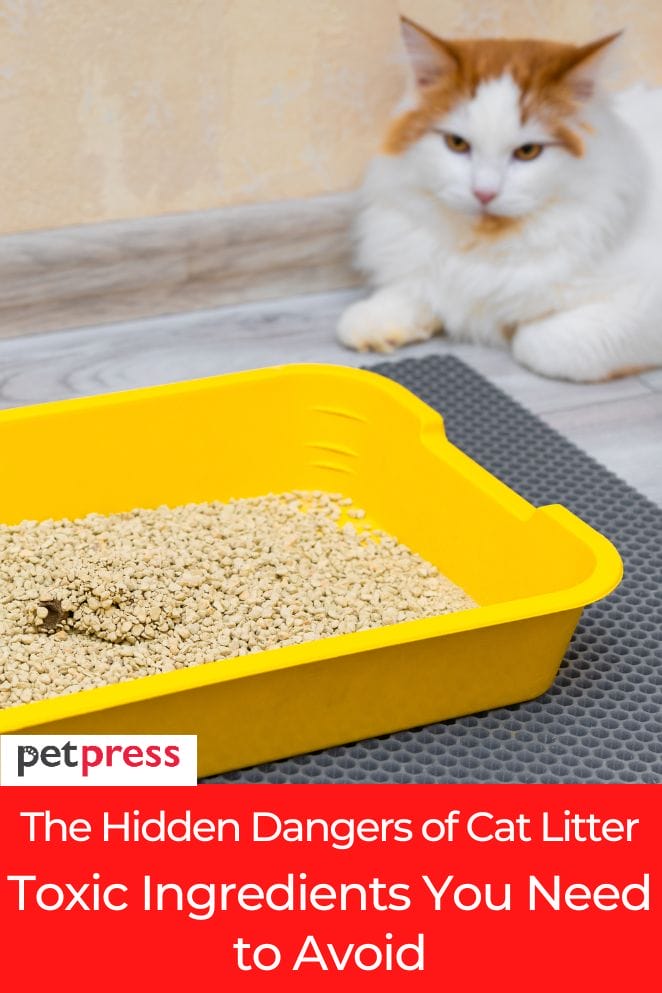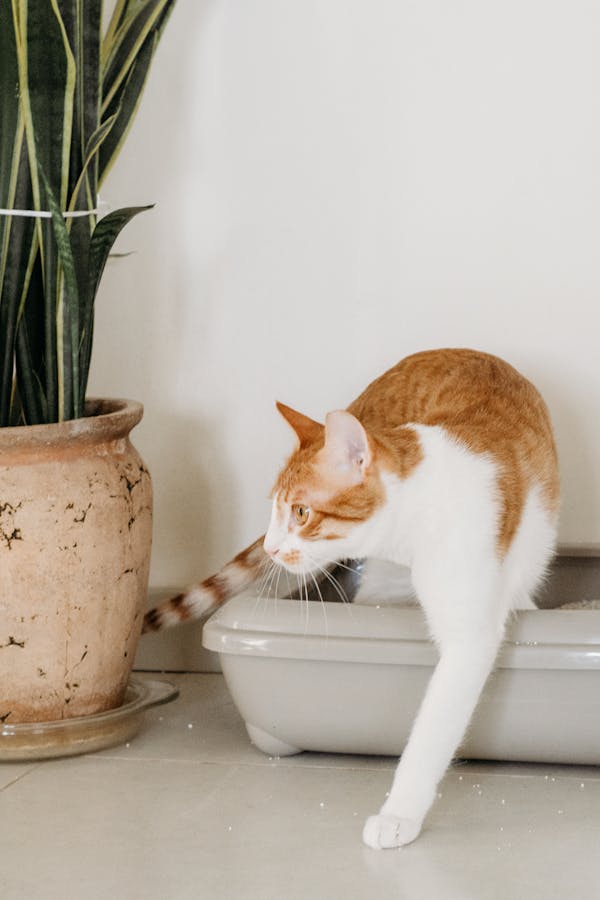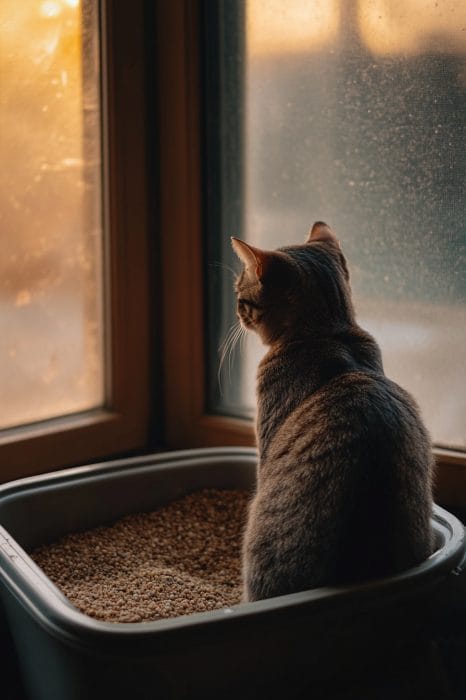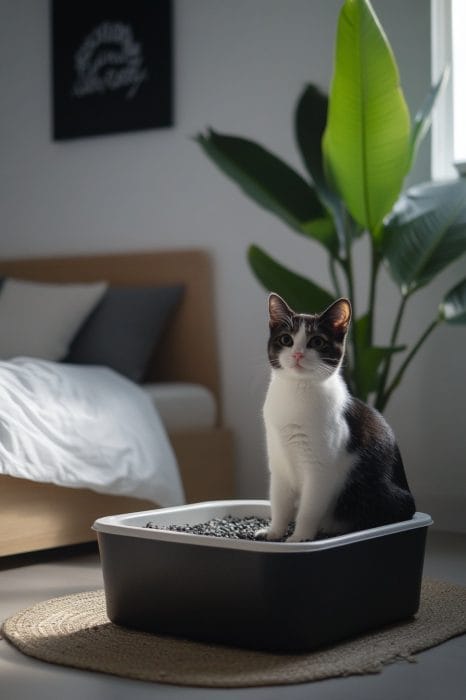
Cat litter is a staple in homes with feline companions, yet not many cat owners consider the potential dangers hidden in those little granules.
While your cat’s comfort and hygiene are a top priority, it’s equally crucial to understand the risks certain cat litter ingredients pose to both your pet’s health and your own.
This guide explores common types of cat litter, identifies toxic components, and provides tips on choosing a safer alternative for your household.
Common Cat Litter Types
With so many cat litter options available, it can be tricky to know which one is best for your cat and your home.
Here’s a simple guide to the most popular types of cat litter and their benefits:
Clay (bentonite) litter
Clay litter is one of the most common choices because it clumps easily, making cleanup a breeze.
However, it contains bentonite clay, which swells when wet.
While convenient, it’s worth noting that this type of litter isn’t environmentally friendly and may have health concerns for cats and humans.
Crystal (silica gel) litter
Crystal litter is known for its top-notch odor control and absorbency.
Made from silicon dioxide, it looks like clear or slightly tinted crystals.
While it keeps litter boxes dry and odor-free, its safety for long-term use is still debated.
Recycled paper litter
This eco-friendly option is made from compressed paper pellets or granules.
It’s soft, dust-free, and gentle on your cat’s paws, making it a great choice for cats with allergies or respiratory sensitivities.
Natural/biodegradable litter
Natural litters are made from materials like corn, wheat, coconut husks, wood, or walnut shells.
They’re environmentally friendly, chemical-free, and a safer choice for your cat and your household.

Toxic Ingredients in Cat Litter
Not all cat litter is safe for your furry friend.
Some types contain harmful ingredients that can affect your cat’s health—and even yours.
Here’s what to watch out for:
Clay cat litter
- Bentonite clay: This common ingredient is mined through destructive strip mining. Cats often ingest small amounts while grooming, which can cause intestinal blockages.
- Dust: Clay litter produces fine dust that can irritate your cat’s lungs, potentially leading to respiratory issues like asthma over time.
Silica gel litter
- Silica dust: This litter is highly absorbent but can release fine particles into the air. Long-term exposure to silica dust can harm your cat’s lungs and yours, increasing the risk of silicosis.
Scented cat litter
- Artificial fragrances: Strong scents might seem helpful for masking odors, but they can trigger allergies or asthma in both cats and humans. Cats have sensitive noses, and overpowering scents may even deter them from using the litter box.
Cedar cat litter
- Essential oils: Cedarwood naturally contains oils that can irritate your cat’s skin or cause allergic reactions. While the smell is appealing to us, it might not be safe for your pet.
Recycled paper litter
While generally safer, some recycled paper litters are processed with chemical binders or bleaches.
Always check the label to ensure the litter is free of harmful chemicals.

Health Risks for Cats and Humans
The type of cat litter you choose can have a big impact on the health of both your cat and your family.
Some litters contain toxic ingredients that can lead to serious health problems if not chosen carefully.
Here’s a closer look at the risks:
Health risks for cats
Cats are especially vulnerable to the harmful effects of toxic litter because they spend so much time in close contact with it.
Common health concerns include:
- Respiratory issues: Dust from certain types of litter, like clay or silica, can irritate your cat’s lungs.
- Allergies: Some cats develop skin or respiratory allergies from artificial fragrances or harsh chemicals in scented litters.
- Digestive problems: Cats often groom themselves after using the litter box, which means they may accidentally ingest small amounts of litter.
- Toxic reactions: Some natural materials, like cedarwood, contain oils that may irritate a cat’s skin or lead to other adverse reactions.
Health risks for humans
Cat litter isn’t just a concern for your feline—it can also pose health risks to you and your family:
- Respiratory problems: Fine particles and dust from certain litters can worsen asthma or allergies in people, especially if the litter is used in a poorly ventilated space.
- Exposure to harmful bacteria: Handling soiled cat litter can expose you to bacteria and parasites, including Toxoplasma gondii.
Choosing the Right Cat Litter
When selecting cat litter, consider these factors:
Key factors to consider
Low dust levels
Cats and humans both benefit from low-dust or dust-free litter.
Less dust means healthier lungs and a cleaner home.
Odor control
Look for natural odor absorbers like baking soda or activated charcoal.
These are safer and more effective than artificial fragrances, which can irritate your cat’s sensitive nose.
Clumping ability
Clumping litter is convenient for scooping, but make sure it doesn’t contain harmful chemicals that could harm your cat if ingested.
Eco-friendliness
Consider biodegradable or sustainably sourced options to reduce environmental impact.
Materials like recycled paper or plant-based litter are great choices.
Cost
While it’s tempting to go for the cheapest option, remember that poor-quality litter may come with hidden costs, like potential health issues for your cat.
Invest in quality for long-term savings.
Recommended Ingredients
- Plant-based litter: Options made from corn, wheat, or recycled paper are safe for your cat and better for the environment.
- Silica-free crystal litter: This type offers excellent odor control without the risks associated with silica dust.
Ingredients to Avoid
- Clay litter: It may clump well, but its production is harmful to the environment, and it poses health risks to cats if ingested or inhaled.
- Silica dust: Crystalline silica can lead to respiratory issues for both cats and humans.
- Artificial additives: Fragrances and chemicals might mask odors, but they can cause allergies or respiratory irritation. Stick with unscented or naturally scented litters.

Final Thoughts
Choosing the right cat litter isn’t just about convenience—it’s about your cat’s health and the well-being of your home.
By steering clear of harmful ingredients and considering safer, eco-friendly options, you’re creating a healthier, happier environment for your furry friend.
A thoughtful choice can make all the difference for your cat’s comfort and your peace of mind.
- Does Cat Litter Melt Ice? The Complete Guide to Winter Safety - January 30, 2026
- Happy Tail Dogs: Understanding This Common Canine Condition - January 29, 2026
- How Cold Can Outdoor Cats Handle? Feline Winter Safety - January 27, 2026


GIPHY App Key not set. Please check settings